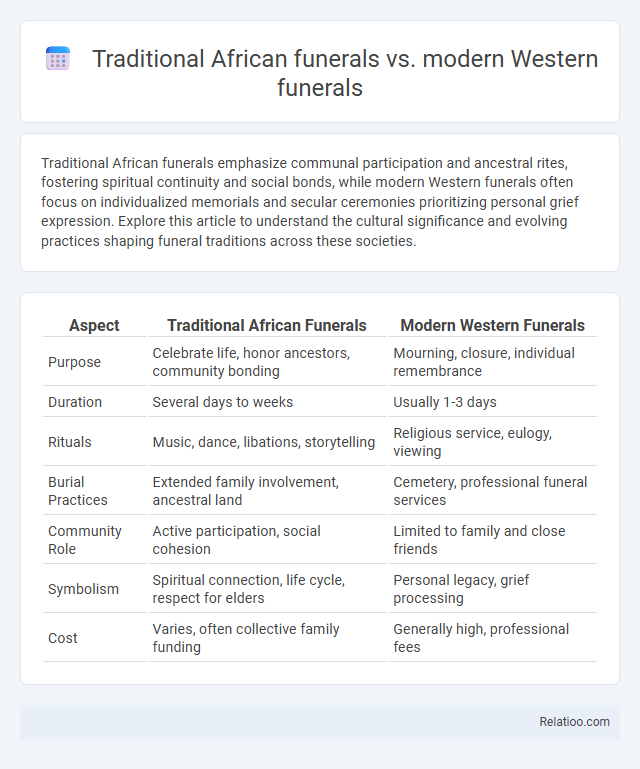Traditional African funerals emphasize communal participation and ancestral rites, fostering spiritual continuity and social bonds, while modern Western funerals often focus on individualized memorials and secular ceremonies prioritizing personal grief expression. Explore this article to understand the cultural significance and evolving practices shaping funeral traditions across these societies.
Table of Comparison
| Aspect | Traditional African Funerals | Modern Western Funerals |
|---|---|---|
| Purpose | Celebrate life, honor ancestors, community bonding | Mourning, closure, individual remembrance |
| Duration | Several days to weeks | Usually 1-3 days |
| Rituals | Music, dance, libations, storytelling | Religious service, eulogy, viewing |
| Burial Practices | Extended family involvement, ancestral land | Cemetery, professional funeral services |
| Community Role | Active participation, social cohesion | Limited to family and close friends |
| Symbolism | Spiritual connection, life cycle, respect for elders | Personal legacy, grief processing |
| Cost | Varies, often collective family funding | Generally high, professional fees |
Introduction: Understanding Funeral Traditions
Funeral traditions vary significantly across cultures, reflecting diverse beliefs about death and the afterlife. Traditional African funerals emphasize community involvement, elaborate ceremonies, and ancestral reverence, highlighting the spiritual connection between the living and the deceased. In contrast, modern Western funerals often prioritize personalization and simplicity, incorporating rituals such as memorial services, eulogies, and graveside burials that focus on honoring individual life stories.
Historical Perspectives on African and Western Funerals
Traditional African funerals emphasize communal participation, ancestral veneration, and elaborate rites reflecting spiritual beliefs rooted in indigenous cultures, contrasting with modern Western funerals that prioritize individual remembrance, formal ceremonies, and secular or religious services shaped by Christian and secular traditions. Historically, African funeral rituals have served as critical social events reinforcing community bonds and continuity with ancestors, while Western funeral practices have evolved from medieval Christian liturgies to diverse contemporary customs influenced by cultural shifts and modernization. Funeral rituals in both contexts embody deep historical significance, offering insights into distinct societal values, worldviews, and approaches to death and the afterlife.
Core Beliefs and Cultural Significance
Traditional African funerals emphasize ancestral reverence and community unity, where rituals honor the deceased's journey to the afterlife and strengthen familial bonds. Modern Western funerals often prioritize individual remembrance and personal legacy, incorporating customizable ceremonies that reflect the deceased's values and social identity. Understanding these core beliefs helps you appreciate the cultural significance embedded in funeral rituals, highlighting how societies navigate grief and celebrate life differently.
Rituals and Ceremonial Practices Compared
Traditional African funerals emphasize communal participation with elaborate rituals involving music, dance, and symbolic rites to honor ancestors, while modern Western funerals typically focus on personalized ceremonies often held in funeral homes or churches with eulogies and floral tributes. Funeral rituals in African cultures serve not only to mourn but also to celebrate the deceased's life and ensure spiritual transition, contrasting with Western practices that may prioritize remembrance and closure in a more subdued setting. Understanding these differences can help you appreciate the cultural significance and variety of ceremonial practices across societies.
Duration and Structure of Funerals
Traditional African funerals often span several days, incorporating communal gatherings, elaborate rites, and extended mourning periods reflecting deep ancestral respect. Modern Western funerals typically last a few hours, featuring structured ceremonies like viewings, memorial services, and brief receptions, emphasizing efficiency and formality. Your understanding of funeral rituals varies significantly based on cultural context, with duration and structure shaped by societal values and customs.
Role of Family and Community Involvement
Traditional African funerals emphasize strong family and community involvement, with communal preparations, collective mourning, and rituals that honor ancestors, reinforcing social bonds and cultural identity. Modern Western funerals often involve immediate family with professional services managing ceremonies, focusing on personalized, private remembrance rather than broad community participation. Understanding these differences can help Your family choose meaningful ways to celebrate life and support one another through grieving.
Symbolism: Dress, Music, and Offerings
Traditional African funerals emphasize symbolism through vibrant dress, rhythmic drumming, and meaningful offerings like food and ancestral gifts to honor the deceased's spirit. Modern Western funerals often feature somber black attire, hymns or classical music, and floral arrangements as symbols of respect and mourning. Understanding these diverse funeral rituals helps you appreciate how cultural values shape expressions of grief and remembrance.
Technological Influence in Modern Western Funerals
Modern Western funerals increasingly integrate advanced technology such as livestreaming services, virtual memorials, and digital guestbooks, offering broader accessibility and personalized experiences. Traditional African funerals emphasize communal participation and cultural rituals passed down through generations, often relying less on technology and more on oral traditions and symbolic ceremonies. Your ability to connect with distant family and friends is enhanced through these digital innovations, contrasting with the more tactile and community-focused nature of traditional African funeral rites.
Impact of Globalization on Funeral Practices
Globalization has significantly influenced funeral practices, blending Traditional African funerals, known for their elaborate ceremonies and communal participation, with Modern Western funerals that emphasize simplicity and personalization. Your experience may now include hybrid rituals incorporating technology, such as live streaming services, alongside customary rites like drumming or dance. This cross-cultural exchange enriches mourning customs while challenging the preservation of distinct cultural identities.
Evolving Trends and Future Directions
Traditional African funerals emphasize communal participation, ancestral reverence, and elaborate rituals reflecting cultural heritage, while modern Western funerals prioritize personalization, efficiency, and sometimes eco-friendly practices. Evolving trends indicate a growing fusion of cultural elements, increased digital memorialization, and a shift towards sustainable burials across both contexts. Future directions point to enhanced integration of technology, such as virtual attendance and blockchain for memorial records, alongside a resurgence in culturally authentic ceremonies adapted to contemporary societal values.

Infographic: Traditional African funerals vs Modern Western funerals
 relatioo.com
relatioo.com